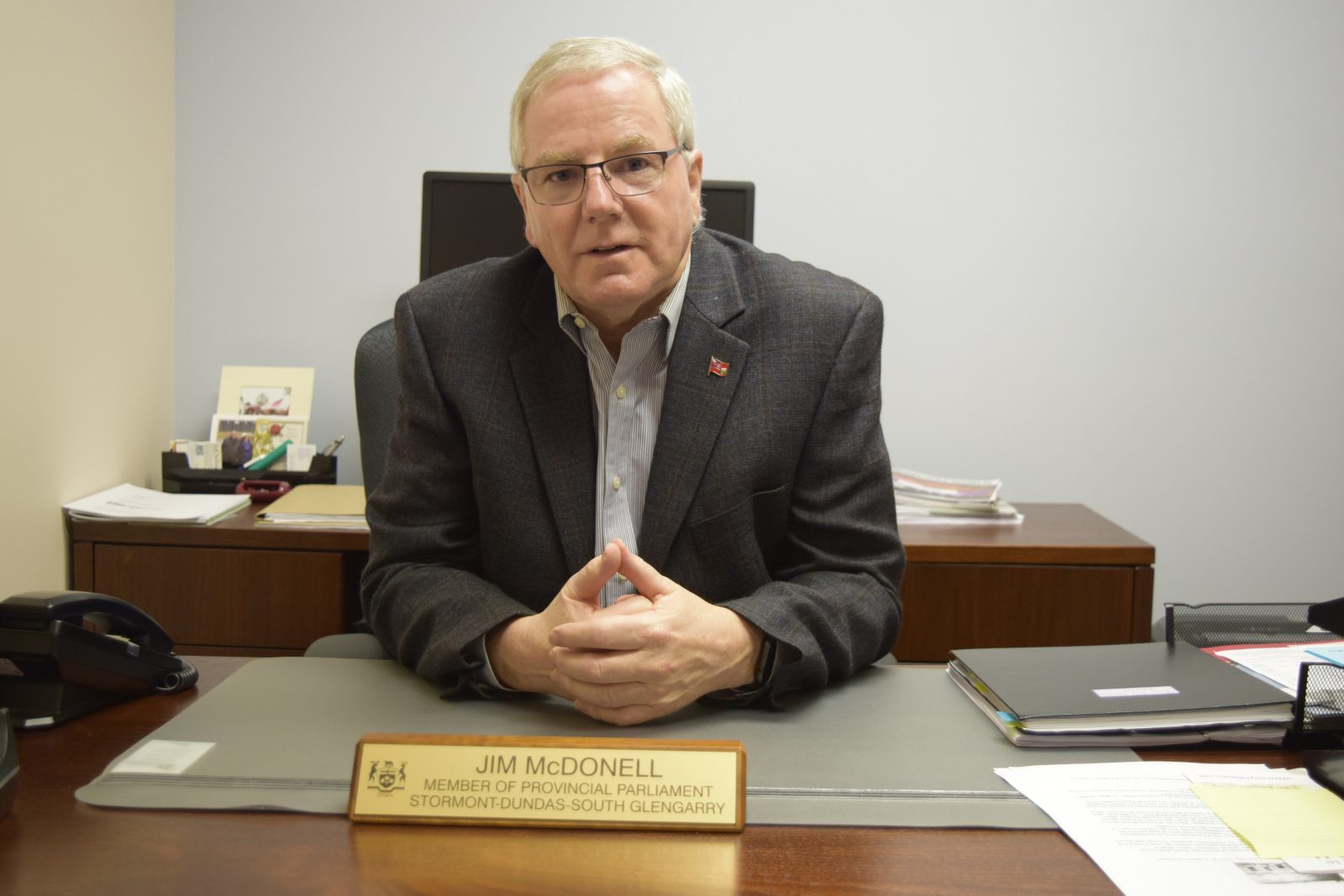I sat down with Stormont, Dundas and South Glengarry MPP Jim McDonell to talk about his first year as a member of the Progressive Conservative government of Premier Doug Ford. My questions will be marked with a NS and Jim’s answers will be marked with a JM.
NS: So, one year since the Progressive Conservatives took control of the gov’t here in Ontario. Jim, what’s been the big highlights for you over that time.
JM: Well, I look over the year and being the PA for the Ministry of Municipal Affairs and Housing, I think it’s been very positive and a funny thing happened the other day, of course there are always rumours of changes coming up, and the AMO board endorsed Minister Clark’s relationship with them and hoping there would be no change. So that’s a positive I think.
NS: You’ve been an MPP here for eight years. How has your work as an MPP in this area changed beyond now being a PA?
JM: Well you have access to the ministers, not that you didn’t have access before, but you know them, for many of them you’ve sat with them for many years, pretty close to them, so I think there’s a relationship there being involved with government, certainly being heard which is, at least giving the idea of being hear, where in the past in the opposition there was really no opportunity for that. So, I think that being involved and having the ability to have some impact.
NS: When you were sworn into the government a year ago, what were some of your goals, and do you feel you’ve reached them?
JM: I think that if you go back over my years, I’ve worked with some of the local businesses and some of the changes that I think we’ve come a long way with the college of trades, the apprenticeship ratios, somethings that they saw as real roadblocks to their success and I’m somewhat proud that not too long ago we were at a conference and the Ontario Electrical League acknowledged the work we’ve done and talked about the additional people they were able to hire because of the changes. You know, those are young people looking for jobs and before, because there were arbitrary numbers that were put in place that restricted people’s entry into the workplace.
NS: What do you think has been the government’s biggest accomplishment in this first year? There’s been a lot of changes.
JM: A lot of changes. I think that you know, we were talking the other day, one thing that has gone relatively unnoticed is our climate action plan that was issued last November, and a lot of things in that plan, there’s a plan to deal with plastics. I looked at the article in the Freeholder just last week, it talked about the federal plan to ban plastics, but it mentioned that Ontario was the only province with a plan in place. I think we’re looking at a practical solution of landfills filling up. It’s a big expense. We’re looking at moving those costs from municipalities over to the producers, which is another big win for the municipalities. The blue box plan is an expensive plan paid for by property taxes.
NS: What can Ontario expect from the PC government over the next year? The next three years?
JM: Well, there’s no question we’re working through education, we’re looking at trying to improve results. We have a shortage of skilled labour in the province. I wouldn’t say a large number, but I’d say a substantial number of people looking for jobs. So, matching those skills up has been one of our themes in getting elected. We have a mismatch of people getting educated where there’s no jobs, we’re making sure young people are aware of where the jobs are. As well going back and making sure when you get your high school diploma it is actually worth something. I met with a couple of local business people talking about having a hard time finding people to fill their positions with skills or just unable to complete basic tests, which is kind of surprising, but it is just the reality of it.
NS: In the first year there was also several announcements of cuts to different programs and budgets. The Premier said that is in response to the debt the province is facing. Will this be a continuing trend, or do you think most of the cuts were gotten out of the way in the first year?
JM: I hear talk about a lot of cuts in areas where we’ve actually increased funding, healthcare and education and social services are areas where if you look at our budget we’ve substantially increased. So, I guess as you move money around, people report that as a cut, but I think we were elected to make some changes to protect what needs to be protected. We’re spending about $35 million a day on interest charges and that will go up almost another billion by the end of the year. So, these are things that have to be addressed, I mean $35 million that will construct the Cornwall Hospital project every two days, so that’s substantial money and I just don’t think we can let that grow. At the same time, we have to move things around and look at priorities. Do we want to spend money in a program that maybe is not effective, not efficient at expense of hospital beds. No matter when you make a change, it affects people, but over all at the end of they day, there will be no jobs lost in healthcare or education, there will actually be increases, because we need more frontline people and we’re finding the systems are very top heavy and the people working with everyday people aren’t there they’re in the back office, not really doing anything and not doing what they want to do.
NS: In the same vein as talking about the cuts, the cuts from what I remember began with the French language and Ombudsman’s office we saw the protest outside of your office here when that was announced, there have been several other protests organized by the Cornwall District Labour Council and I was just wondering, what was your response to that? What is your response to parents with children with autism? How have you dealt with people in the riding who are concerned about these cuts.
JM: Well we’ve met with a lot of people over the last year. Look at one of these things one-on-one when we talk about the Francophone issue, if you look at the legislation it is very clear that those people we just moved over to the office of the Ombudsman. Like many of the or some of the other independent officers. We found that costs were escalating, and in a lot of ways, that job, their ability to investigate complaints was restricted. The Ombudsman had a lot more power and under his office, the position moved over as a deputy. All the employees moved over without the loss of job or position and that is very specific in the legislation. That was for two reasons, one was to make it more effective, and the other is to again, it’s a priority, when you’re looking at where you have to contain costs and where you have to increase costs, like I said, in healthcare and education, you have to make choices. With the autism group we’ve almost tripled the funding, we’ve changed the way its gone out to make sure that everybody gets help. Right now, about three quarters of the children with autism receive no funding and we didn’t think that was fair. So, we increased funding and as with anything, there are winners and losers, but the vast majority in this case are winners.
NS: Looking forward to the coming year, what do you hope to accomplish in Queen’s Park and what do you hope to accomplish in the riding?
JM: I think as always, the riding, I mean you’ll see in the paper, the lack of growth in the riding. We are somewhat constrained because of the agricultural nature of the riding, growth is somewhat limited, because the land is for a specific use. In the city itself, we need more employment. You talk to employers who are having a hard time getting employees, growth gets very difficult. So, we have to somehow fix that problem. Talking to one of the local employers it is everything from professionals right down to general labour. We just can’t get people. People are driving from the West Island of Montreal daily to fill positions. So that’s a concern. If you’re starting a business and already know there’s a labour problem, you might look elsewhere and that’s an issue.




